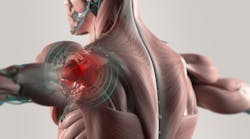NSC Awards Innovators Aiming to Solve Most Common Workplace Injury
In an effort to reduce instances of work-related musculoskeletal disorders, or MSDs, the National Safety Council, awarded nearly $275,000 through its recently-launched Research to Solutions (R2S) grant and MSD Solutions Pilot Grant 1.0 programs to help nine leading organizations advance promising new safety technologies.
Unveiled in March of this year through the Council’s MSD Solutions Lab, these new grant programs aim to foster innovative, transferable solutions to mitigate MSDs – the most common workplace injury – across a range of sectors and workplaces.
For the inaugural 2023-2024 grant cycle, NSC called upon R2S applicants to support one or more key research areas, including emerging technologies, solutions to jobs or tasks known to have high MSD risk, MSD management systems, future of work, and total worker wellbeing. This year’s R2S grant winners include the following organizations:
- Rutgers University (Piscataway, New Jersey), awarded $75,000 to implement an automated image captioning system, designed to help employers better identify ergonomic risk factors and real-time solutions.
- Iowa State University (Ames, Iowa), awarded $61,000 to develop a predictive model and AI-based ergonomics app for risk assessment and mitigation that enables employers in high-risk industries to understand shoulder MSD risk in different scenarios impacting their workers – with and without an exoskeleton – to make more informed decisions about injury mitigation.
- Virginia Tech (Blacksburg, Virginia), awarded $51,000 to implement inexpensive, camera-based marker-less sensors along with machine-learning models to assess worker physical exposures and MSD risks more efficiently, accurately and comprehensively.
- University of Waterloo (Waterloo, Canada), awarded $37,000 to generate evidence-based guidance on computer vision-based MSD risk assessment technology in the workplace, so employers can better determine the optimal approach and timing for integrating computer vision-based MSD risk assessment tools into their ergonomics programs.
“Hoping that the work we do each day translates to safer outcomes for millions of workers on the frontline is what inspires our team to continually push the boundaries of safety innovation,” said R2S grant winner Dr. Maury A. Nussbaum, CPE, professor of Industrial and Systems Engineering at Virginia Tech, in a statement. “MSDs are notoriously complex, as is their prevention, but technology advancements have made it possible for research teams like ours to collaborate with others, assess root causes, and propose scalable solutions more effectively than ever. We are honored to build on this progress through our work with the MSD Solutions Lab and R2S grant.”
The MSD Solutions Pilot Grant 1.0, designed to help organizations prevent MSDs specifically caused by manual materials handling, provides MSD Pledge members with the opportunity to team with technology providers to trial emerging solutions in real-life applications. Pledge members selected for the inaugural MSD Solutions Pilot Grant 1.0 include:
- Amerisure Insurance, awarded $10,000, will work with both computer-vision provider TuMeke Ergonomics and HeroWear, which specializes in passive back-assist exosuits, to prevent MSDs enterprise-wide.
- Burlington Hydro, awarded $10,000, will use TuMeke Ergonomics’ computer vision technology to assist with conducting ergonomic assessments of the company’s powerline technicians.
- General Electric Aerospace Erlanger Kentucky, awarded $10,000, will partner with HeroWear to better understand the operational benefits and worker impact of using exosuits to unload cargo trailers.
- Guarantee Electrical Company, awarded $10,000, will work with TuMeke Ergonomics to detect unsafe postures and glean data-driven insights to optimize their workplace safety programs.
- Lafarge North America, awarded $10,000, will team with TuMeke Ergonomics to use computer vision technology to scan construction workers’ movements during manual material handling activities to better identify MSD risks and assess targeted solutions.
“Overexertion involving handling objects is the No. 1 cause of disabling workplace injuries, and uncovering safer ways to help employees lift, lower and transport items is fundamental to achieving a drastic reduction in MSD injuries worldwide,” said Paul Vincent, executive vice president of workplace practice at NSC, in a statement. “Both grant programs call upon the industry’s brightest minds to help advance and find new ways to solve this pressing safety challenge.”
The inaugural grant recipients will have an opportunity to present their safety findings at the 2024 NSC Safety Congress & Expo or another event next year.
About the Author
EHS Today Staff
EHS Today's editorial staff includes:
Dave Blanchard, Editor-in-Chief: During his career Dave has led the editorial management of many of Endeavor Business Media's best-known brands, including IndustryWeek, EHS Today, Material Handling & Logistics, Logistics Today, Supply Chain Technology News, and Business Finance. In addition, he serves as senior content director of the annual Safety Leadership Conference. With over 30 years of B2B media experience, Dave literally wrote the book on supply chain management, Supply Chain Management Best Practices (John Wiley & Sons, 2021), which has been translated into several languages and is currently in its third edition. He is a frequent speaker and moderator at major trade shows and conferences, and has won numerous awards for writing and editing. He is a voting member of the jury of the Logistics Hall of Fame, and is a graduate of Northern Illinois University.
Adrienne Selko, Senior Editor: In addition to her roles with EHS Today and the Safety Leadership Conference, Adrienne is also a senior editor at IndustryWeek and has written about many topics, with her current focus on workforce development strategies. She is also a senior editor at Material Handling & Logistics. Previously she was in corporate communications at a medical manufacturing company as well as a large regional bank. She is the author of Do I Have to Wear Garlic Around My Neck?, which made the Cleveland Plain Dealer's best sellers list.
Nicole Stempak, Managing Editor: Nicole Stempak is managing editor of EHS Today and conference content manager of the Safety Leadership Conference.
